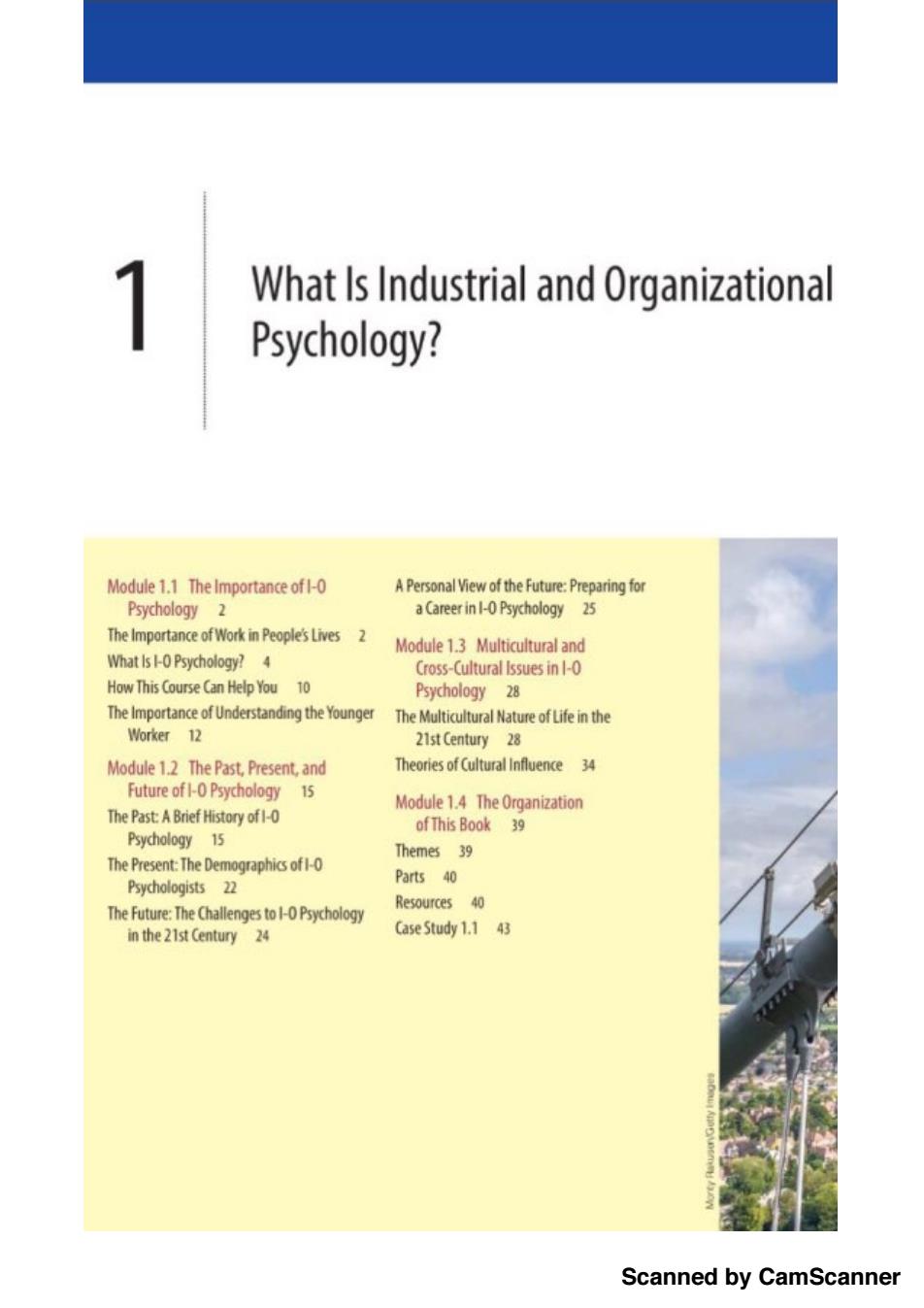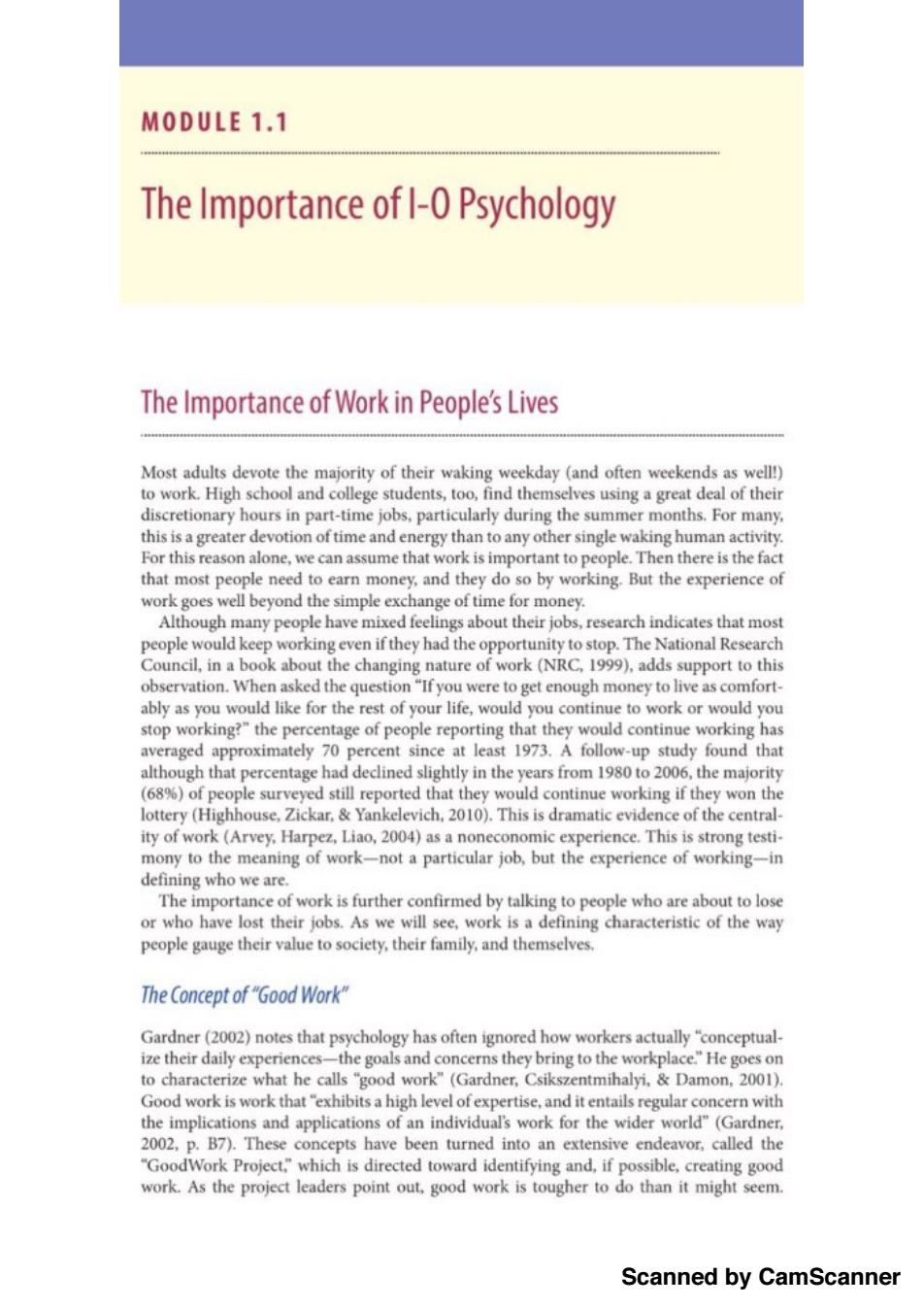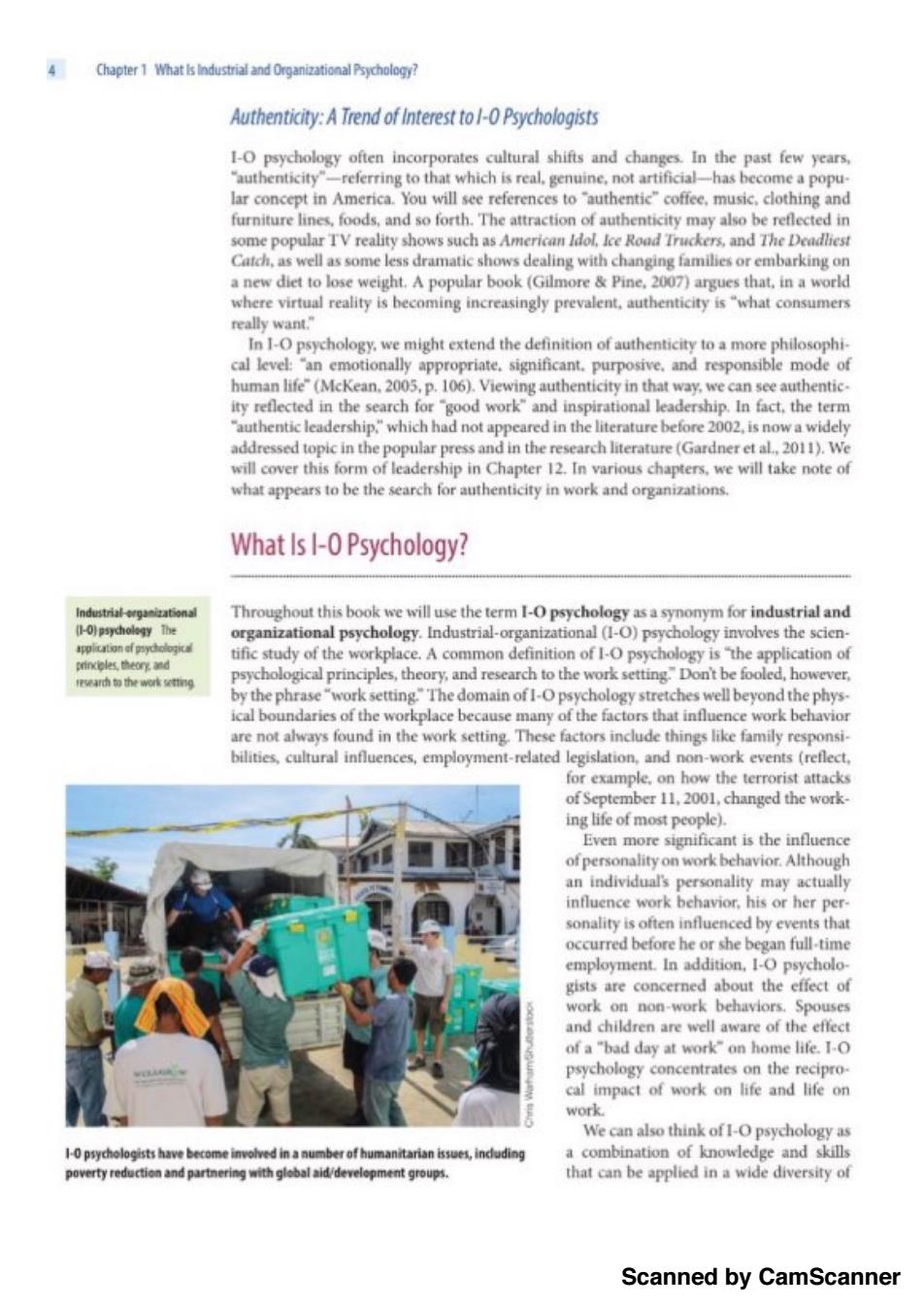
1 What Is Industrial and Organizational Psychology? Module 1.1 The lmportance of1-0 A Personal View of the Future:Preparing for Psychology 2 a Careerinl-0 Psychology 25 The Importance of Work in People's Lives 2 Module 1.3 Multicultural and What Is I-0 Psychology?4 Cross-Cultural Issues in I-0 How This Course Can Help You 10 Psychology 28 The Importance of Understanding the Younger The Multicultural Nature of Life in the Worker 12 21st Century 28 Module 1.2 The Past,Present,and Theories of Cultural Influence 34 Future of 1-0 Psychology 15 Module 1.4 The Organization The Past:A Brief History of1-0 of This Book 39 Psychology 15 Themes 39 The Present:The Demographics of1-0 Parts 40 Psychologists 22 The Future:The Challenges to-Psychology Resources 40 in the 21st Century 24 Case Study 1.1 43 Scanned by CamScanner
Scanned by CamScanner

MODULE 1.1 The Importance of I-0 Psychology The Importance of Work in People's Lives Most adults devote the majority of their waking weekday (and often weekends as well!) to work.High school and college students,too,find themselves using a great deal of their discretionary hours in part-time jobs,particularly during the summer months.For many. this is a greater devotion of time and energy than to any other single waking human activity. For this reason alone,we can assume that work is important to people.Then there is the fact that most people need to earn money,and they do so by working.But the experience of work goes well beyond the simple exchange of time for money. Although many people have mixed feelings about their jobs,research indicates that most people would keep working even if they had the opportunity to stop.The National Research Council,in a book about the changing nature of work(NRC,1999),adds support to this observation.When asked the question "If you were to get enough money to live as comfort- ably as you would like for the rest of your life,would you continue to work or would you stop working?"the percentage of people reporting that they would continue working has averaged approximately 70 percent since at least 1973.A follow-up study found that although that percentage had declined slightly in the years from 1980 to 2006,the majority (68%)of people surveyed still reported that they would continue working if they won the lottery(Highhouse,Zickar,Yankelevich,2010).This is dramatic evidence of the central- ity of work(Arvey,Harpez,Liao,2004)as a noneconomic experience.This is strong testi- mony to the meaning of work-not a particular job,but the experience of working-in defining who we are. The importance of work is further confirmed by talking to people who are about to lose or who have lost their jobs.As we will see,work is a defining characteristic of the way people gauge their value to society,their family,and themselves. The Concept of "Good Work" Gardner(2002)notes that psychology has often ignored how workers actually "conceptual- ize their daily experiences-the goals and concerns they bring to the workplace."He goes on to characterize what he calls "good work"(Gardner,Csikszentmihalyi,Damon,2001). Good work is work that "exhibits a high level of expertise,and it entails regular concern with the implications and applications of an individual's work for the wider world"(Gardner, 2002,p.B7).These concepts have been turned into an extensive endeavor,called the "GoodWork Project,"which is directed toward identifying and,if possible,creating good work.As the project leaders point out,good work is tougher to do than it might seem. Scanned by CamScanner
Scanned by CamScanner

1.1 Thelmportar "Pressure to keep costs low and profits high,to do more in less time,and to fulfill numerous life roles,including that of a parent,a spouse,a friend,(a student!!),a worker,can all make cutting corners tempting"This "corner cutting"leads to what the researchers call "compromised" work:work that is not illegal or unethical, but that still undermines the core values of a trade or a profession-the lawyer who creates opportunities for billing extra hours,the plumber who uses inferior. cheaper materials for a repair. Martin Luther King.Jr.,captured the essence of good work eloquently:"If a man is called to be a street sweeper,he should sweep streets even as Michelangelo painted,Beethoven composed music,or American 1-0 psychologist David Morris screened applicants in Shakespeare wrote poetry.He should sweep streets so well that all heaven and earth will pause to say,Here lived a great street sweeper who did his job well"(King.1956). Consider the role of an I-O psychologist who worked in Irag to hire and train the new Iraqi police force.David Morris is an 1-O psychologist who had been helping cities and states in the United States select police officers until September 2004.He decided to trade "his comfortable house in Alexandria,Virginia for a bunk bed in the converted office of Baghdad's former police training facility"(Dingfelder,2005,p.34).Every day, Morris and his staff of 15 administered various tests to up to 300 candidates for possible hire.He and his staff could have earned as much if not more money screening appli- cants for the Philadelphia,or Atlanta,or Dallas police force.But instead,they did such screening in Baghdad to help with the restoration of civil order to Iraq.This is good work as well The interesting aspect of "good"and "bad"work is that the individual worker and the employer together have the power to define good work or to transform good work into bad and vice versa.A disreputable accounting firm can cheat and mislead clients and the public, thus engaging in bad work:that same firm and its employees could be doing good work if they are helping people to manage their money and protect their retirement plans.Good work is not simply the province of politicians or soldiers or relief workers. Gardner describes the depressing consequences of settling for"bad"work: We resign ourselves to our fate.It is difficult to quit one's job,let alone one's whole profession. and few in midlife...have the fortitude to do so.As a result....few feel in a position 30 where they can perform good work.(Gardner.2002.p.B7) The study of work by I-O psychologists and students (you!)is potentially 'good work" because it enables individuals to develop and use skills,and to use them for the benefit of someone other than simply themselves.I-O psychologists have also broadened their focus of study to consider the experience of work.Since the mid-1990s there has been a rapid and substantial increase in I-O research related to the feelings that workers bring to and take from the workplace.In addition,there has been a dramatic increase in research directed toward work-life balance issues.Thus,I-O psychology has recognized that the"experience" of work is more complex than simply tasks and productivity and accidents.You will see the results of this research in Chapter 9. Scanned by CamScanner
Scanned by CamScanner

Chapter 1 What is Industrial and Organizational Psychology? Authenticity:A Trend of Interest to1-0 Psychologists I-O psychology often incorporates cultural shifts and changes.In the past few years, authenticity"-referring to that which is real.genuine.not artificial-has become a popu- lar concept in America.You will see references to"authentic"coffee,music,clothing and furniture lines,foods,and so forth.The attraction of authenticity may also be reflected in some popular TV reality shows such as American ldol,Ice Road Truckers,and The Deadliest Catch,as well as some less dramatic shows dealing with changing families or embarking on a new diet to lose weight.A popular book (Gilmore Pine,2007)argues that,in a world where virtual reality is hecoming increasingly prevalent,authenticity is"what consumers eally want.” In I-O psychology.we might extend the definition of authenticity to a more philosophi- cal level:"an emotionally appropriate.significant.purposive.and responsible mode of human life"(McKean.2005,p.106).Viewing authenticity in that way,we can see authentic. ity reflected in the search for good work"and inspirational leadership.In fact,the term "authentic leadership,"which had not appeared in the literature before 2002,is now a widely addressed topic in the popular press and in the research literature(Gardner et al,2011).We will cover this form of leadership in Chapter 12.In various chapters.we will take note of what appears to be the search for authenticity in work and organizations. What Is I-0 Psychology? Industrial-erganizational Throughout this book we will use the term I-O psychology as a synonym for industrial and (1-0)psycholegy The organizational psychology.Industrial-organizational(1-O)psychology involves the scien- ppycogc tific study of the workplace.A common definition of I-O psychology is the application of princeles.theor年and ah每h#%tng psychological principles,theory,and research to the work setting."Don't be fooled,however, by the phrase"work setting"The domain of1-O psychology stretches well beyond the phys- ical boundaries of the workplace because many of the factors that influence work behavior are not always found in the work setting.These factors include things like family responsi- bilities,cultural influences,employment-related legislation,and non-work events (reflect, for example.on how the terrorist attacks of September 11.2001,changed the work- ing life of most people). Even more significant is the influence of personality on work behavior.Although an individual's personality may actually influence work behavior,his or her per- sonality is often influenced by events that occurred before he or she began full-time employment.In addition.I-O psycholo- gists are concerned about the effect of work on non-work behaviors.Spouses and children are well aware of the effect of a "bad day at work"on home life.I-O psychology concentrates on the recipro- cal impact of work on life and life on work. We can also think of 1-O psychology as 1-0psychologists have become involved in a number of humanitarian issues,induding a combination of knowledge and skills poverty reduction and partmering with global aid/development groups. that can be applied in a wide diversity of Scanned by CamScanner
Scanned by CamScanner

1.1 The Importa settings rather than just in the arena of traditional work.The example of David Morris helping to select the Traqi police force is one of those examples.In a similar vein.I-O psy. chologists are helping to revise the test given to individuals seeking U.S.naturalization (Ulewicz.2005). A more formal definition of 1-0 psychology,approached from the perspective of the I-O psychologist and what he or she does,has been adopted by the Society for Industrial and Organizational Psychology (an association to which many I-O psychologists belong.and which we will refer to in this text by the acronym SIOP): Industrial-Organizational (called I-O)Psychologists recognize the interdependence of indi- viduals,organizations,and society,and they recognize the impact of factors such as increasing government influences growing consumer awareness,skill shortages,and the changing nature of the workforce.I-Opsychologists facilitate responses to issues and problems involving people at work by serving as advisors and catalysts for business,industry,labor.public,academic. community.and health organizations They are: Scientists who derive principles of individual,group,and organizational behavior through research:Consultants and staff psychologists who develop scientific knowledge and apply it to the solution of problems at work;and Teachers who train in the research and application of Industrial-Organizational Psychology.(http://www.sioporg/history/crsppp.aspx.2012 Society for Industrial and Organizational Psychology,Inc.All Rights Reserved.Reprinted by permission of SIOP.www.siop.org.) Refer to Tables 1.1 and 1.2 for lists of the common areas of concentration for I-O psy- chologists and the common job titles they hold.A series on the SIOP website (http://www. siop.org/psychatwork aspx)called "Psychology at Work:What do 1-O psychologists really do?"provides profiles of 1-O psychologists that include how they became interested in I-O psychology,what a typical day is like,what aspects of the job are most challenging.why I-O psychology matters,and advice to future I-O psychologists. Traditionally,I-O psychology has been divided into three major concentrations:per- sonnel psychology,organizational psychology,and human engineering.We will briefly consider each of these concentrations.Even though we will talk about them separately. they often overlap considerably,as we will see. Personnel psychology(often seen as part of human resources management,or HRM) addresses issues such as recruitment,selection,training,performance appraisal,promo- tion,transfer.and termination.The approach assumes that people are consistently different in their attributes and work behaviors and that information about these differences can be used to predict,maintain,and increase work performance and satisfaction. Organizational psychology combines research and ideas from social psychology and organizational behavior.It addresses the emotional and motivational side of work.It includes topics such as attitudes,fairness,motivation,stress,leadership,teams,and the broader aspects of organizational and work design.In some senses,it concentrates on the reactions of people to work and the action plans that develop as a result of those reactions. Both work and people are variables of interest,and the issue is the extent to which charac- teristics of the people match the characteristics or demands of the work.Of course,organi- zational psychology has implications for performance,but they may not be as direct as is the case with personnel psychology. Human engineering (also called human factors psychology)is the study of the capacities and limitations of humans with respect to a particular environment.The human engineering approach is almost the opposite of the personnel approach.Remember.in the personnel approach the goal is to find or fit the best person to the job.In the human engineering Scanned by CamScanner
Scanned by CamScanner